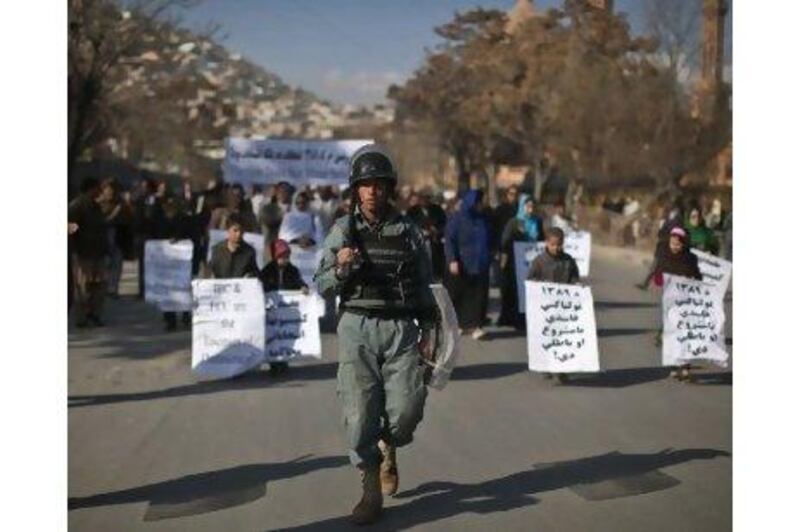KABUL // More than two months after the vote for seats in the Afghan parliament, the names of most of the winning MPs were revealed yesterday. But the controversy surrounding the poll seems destined to drag on, following weeks of turmoil that saw allegations of cheating levelled against everyone from high-ranking government officials to candidates and election staff.
Protesters demonstrated in Kabul yesterday as the results were being announced, and the country's attorney general has vowed to carry out an investigation into the election. Winners have still not been declared for the southern province of Ghazni, where ethnic tensions reflect some of the anger being felt by many Afghans nationwide.
However, the chairman of the Independent Election Commission (IEC), Fazil Ahmad Manawi, described the vote as "a major success" and said the 249-seat lower house of parliament could be formed within a week.
The United Nations, meanwhile, said "a significant step" had been made "in the development of Afghanistan's national electoral capacity".
Whether those comments and the announcement of the results will finally bring an end to the trouble, though, is doubtful. Since the poll was held on September 18, many of those involved have been tainted with serious allegations of corruption.
The IEC has acknowledged that some of its staff helped certain candidates and 1.3 million of the votes originally cast were thrown out for fraud.
Mohammad Ishaq Alako, the country's attorney general, appeared to question the legitimacy of the entire process when, in a statement aired on Afghan television yesterday, he claimed that money had decided the election, saying votes were bought and sold "in Dubai and in Kabul's foreign exchange market".
He added, "I have evidence and documents and I am going to investigate. If no one accepts my investigation, I will not come to my job again."
Mr Alako said he had suspended the spokesmen for the IEC and the other main election body, the Electoral Complaints Commission. However, they claimed they had not been notified.
Pashtuns, Afghanistan biggest ethnic group, believe all these problems have had a disproportionate effect on them. This has led some to warn that violence will now rise and the Taliban's ranks swell as more disillusioned men take up arms.
Often living in the most insecure regions of the country, Pashtuns claim they could not vote in significant enough numbers and point to Ghazni as a prime example of the consequences.
There, according to preliminary results, none of the 11 people elected will be a Pashtun, despite the large population they have in the area.
In Kabul yesterday, Abdullah Jan said he was unable to vote in Kapisa province, where he was registered, because of insecurity, and spoke of the difficulties elsewhere.
"In Ghazni we [Pashtuns] do not even have one MP. The people just have two choices: one is to vote and the other is to increase the violence. If they don't have a representative [in parliament], they will use their other choice," he said.
His warning comes after a Pentagon report published this week described progress in Afghanistan as "uneven". Covering the period from April to the end of September, it said combat incidents were up 300 per cent since 2007 and "corruption continues to have a corrosive effect" on the situation here.
A closer look at the election results also gives some indication of the sheer scale of the problems in many areas, where many people were fearful of going to the polls because of threats of violence.
In Zabul, a volatile southern province, the leading candidate - a woman - received only 756 votes. In Helmand, a Taliban stronghold, another female candidate won a seat in parliament with just 574 votes.
In Kabul the numbers were far more impressive. However, many of the winners are accused of committing serious human-rights abuses during Afghanistan's recent history. They include Haji Mohammed Mohaqiq, who received 16,233 votes, and Abdul Raab Rasul Sayyaf, who had 7,158 votes.
Yaqoub Karimi, a teacher from the eastern province of Khost, said the election there had been "a mess" and was "not free or fair".
"It will have a very bad impact on the situation and prepare the ground for the coming [of the Taliban]. When the people have lost their trust in the government, the government is meaningless."





